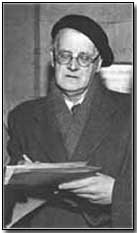Who's Who - Fenner Brockway
 Archibald Fenner Brockway
(1888-1988), the journalist and politician, was vocal in his opposition to
conscripted military service and acted as a prominent pacifist during the
First World War, in which cause he was sent to prison.
Archibald Fenner Brockway
(1888-1988), the journalist and politician, was vocal in his opposition to
conscripted military service and acted as a prominent pacifist during the
First World War, in which cause he was sent to prison.
Born in Calcutta in 1888 and educated at Blackheath in London from 1897-1905 Brockway developed an early fascination with politics, assisting the Liberals during the elections of 1905. He was a founder member of the Old Boys' Association in 1907, by now a committed socialist (in part based upon conversations with Kier Hardie). He was an early member of the Independent Labour Party after a brief spell with the Social Democratic Foundation.
Professionally however Brockway established a career as a journalist, initially at Quiver, a monthly journal, and at the Daily News. Nevertheless Brockway continued to meet with fellow prominent radicals in his role as interviewer for the weekly Christian Commonwealth newspaper, including George Bernard Shaw and H.G. Wells.
Appointed editor of the Labour Elector - the newspaper of the Independent Labour Party - in 1913, Brockway was ideally positioned to state his determinedly pacifist views when war broke out in Europe the following year. An unpopular view during the early stages of the war Brockway's stance resulted in an initial drop in circulation for the Labour Elector, although this was subsequently reversed as the public's initial euphoria waned.
Consequently opposed to conscription and firmly resolved not to enlist in any capacity to serve the war effort, Brockway was a frequent recipient of white feathers, handed to him by indignant young women keen to demonstrate their disgust of his 'cowardice'. Unabashed, Brockway merely remarked that after a while he had collected enough white feathers with which to construct a fan.
Brockway's editorial offices were raided by the police in 1915 and Brockway himself subsequently prosecuted on grounds of publishing seditious material, a case Brockway won in court. Brockway nevertheless continued with his anti-war activities in the face of government opposition. Along with Clifford Allen he founded the No Conscription Fellowship, a body which provided assistance to those who were similarly inclined to refuse wartime service.
In pursuance of this policy Brockway was once again prosecuted in 1916, this time for distributing a leaflet opposing conscription. Ordered to pay a fine in consequence, Brockway and Allen adopted a defiant position. Their refusal to pay led to their incarceration in Pentonville Prison. Shortly after his release, and his refusal to be conscripted, Brockway was re-arrested and despatched this time to the Tower of London. Further harsh treatment (including bread and water punishment) ensued as Brockway continued to write and speak publicly in opposition to the government.
Writing of his prison experiences Brockway noted: "The Governor would summon me into his presence, and instead of standing to attention I would say "Nice morning, isn't it?". One had an extraordinary sense of personal freedom."
Finally released from prison, albeit belatedly some six months after the armistice, Brockway returned to political affairs with the India League, this time campaigning for Indian independence. He also became chairman of the No More War organisation. During the 1926 General Strike he edited the TUC journal, the British Worker.
In 1929 Brockway stood for and was elected to Parliament as Labour Party member for East Leyton, a logical if much-delayed political progression. His stint in the House of Commons was brief however; in opposition to the National Government he found himself without a seat after the 1931 election, a stance that saw him break off ties with the Labour Party.
In spite of his earlier formidable credentials as a confirmed pacifist Brockway nevertheless supported British participation during the Second World War, believing that the forces of fascism could only be dealt with by force: "I could no longer justify pacifism when there was a fascist threat" he later wrote.
With the end of the war Brockway was reconciled with the Labour Party and was returned to Parliament as a Labour MP for Eton and Slough in 1950. Once in parliament he allied with Bevan and Benn and joined the left-leaning Tribune Group. In the late 1950s he was a founder member of the Campaign for Nuclear Disarmament.
Ousted from parliament once more in 1964 Brockway found his way back via a life peerage. As chairman of the Movement for Colonial Freedom he continued to be politically active in spite of his advancing age. As late as 1980 Brockway served as chairman of the World Disarmament Campaign.
A prolific author Brockway penned four volumes of autobiography. He died in 1988 six months shy of his 100th birthday.
French tanks were used for the first time in battle on 17 April 1917, when the 'Char Schneider' (as they were known) was used during the Second Battle of the Aisne.
- Did you know?
